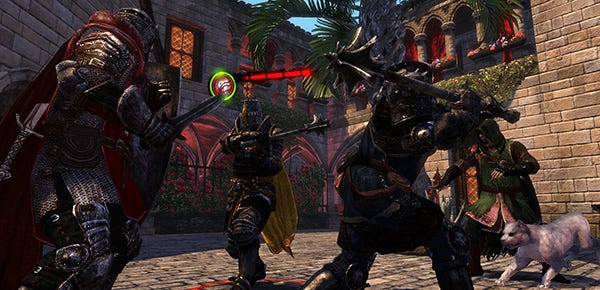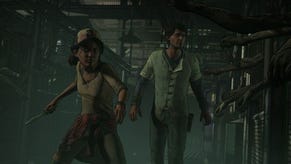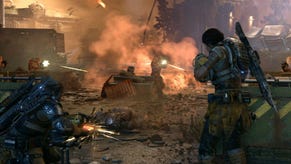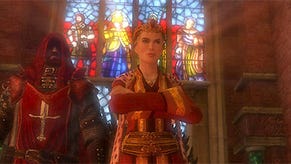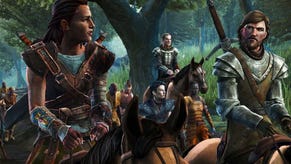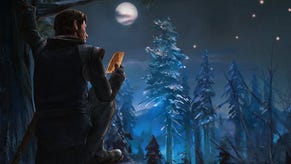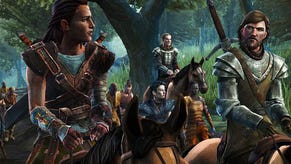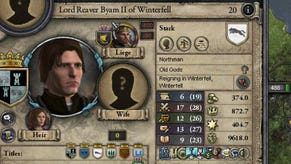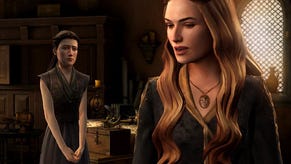A Song Of Scripts & France: Game Of Thrones Chat
A storm of words
Next to be plucked from my bottomless bucket of game preview words is a quick interview with Sylvain Sechi and Thomas Veauclin of Cyanide, lead designer and lead artist respectively on the upcoming Game of Thrones RPG, as peered at last week. Discussed: linearity vs sandbox, the involvement of George R.R. Martin, whether Martin really has a concrete idea of how his books are going to end, why they're not worried that their story won't impact the books' overall narrative, horses, why they went for pause-time combat and how coming up with the script was "like creating a child on top of dead bodies." Ick.
(N.B. Cyanide are French, so before you aim your cannons of grammatical correctness at this transcript, bear in mind they're not speaking their first language)
RPS: You guys seem to have a ton of projects on the go at the moment.
Sylvain Sechi: Yeah yeah. Always better to have lots than few.
Thomas Veauclin: Long days, small nights.
RPS: It’s amazing that this one has been three years in the making, because that’s quite long even by the standards of a Bethesda or an Activision title. How much of that has been full on active development versus sketching it out and working out what you’re going to do?
Sylvain Sechi: I think we spent the first three/four months only Thomas and I, working on story and games, design documents and stuff. We moved from prototype to production with ten people, roughly ten people, for 6/8 months, set up the engine first, the design, making sure what we wanted in the game, make some prototypes and then we moved into full scale production for almost two years…
Thomas Veauclin: One year and a half.
Sylvain Sechi: One year and a half maybe for full scale production with 45 persons, which is actually not so much compared to Bethesda or Bioware which have at least 100, 200 people. Now we’re slowing down because obviously it’s at the end of development, but we were able to keep lots of people, and that was a very good thing for us, to keep working and polishing the game and starting working on DLC. The game is finished now, it’s been approved by Sony and Microsoft so we can’t change it anymore, so we started working on DLC lately.
RPS: It must be a hell of a relief to have it finished after three years.
Sylvain Sechi: Yes, yes. We’re really anticipating the release because three years of play, we obviously had lots of testers, play testers.
RPS: How much does what you’ve got now resemble what you started sketching out three years ago?
Sylvain Sechi: At the very beginning we were going into a bit more open game, a bit less linear, but since we wanted a very very strong story, and also we went into engine limitation, we are using Unreal technology for the game, which is really a game made for linear game, a bit less for Sandbox, which actually was not Sandbox was just a bit more open. So we used a bit the openbox, sandbox aspect to focus more on the story, and I think it was a very good choice because that’s really what the game is about; very very strong story content. It was very close to what we had expected first.
Thomas Veauclin: We tried a lot of things at the beginning in the story in the script, and the game is depending on what we would like to tell and to write, we tried a story with only one character, we tried a story with lots of characters, lots of heroes. Each time it had an impact directly on what we have to make, what we have to realise, and we tried, we tried, we tried, we tried. One thing we tried was to put a lot of things of the books in the game, a lot of characters, a lot of places. At the time ‘What are we talking about? What is the story? What is the relation with the player?’
One thing that was very important to us was to create a new story, we didn’t want to tell a story with high level problem of the king, of the queen, and you’re a nobody. You were the hero, so there are lots of things in the world and you will be totally pushed by the world and by the story of the novels and history in the game. The player is the centre of his adventure, of course, and of the game. So we put a lot of time to write, write, write again, write again, to the background of the character and of the heroes, of your heroes and of all the other characters who could impact on your heroes directly. So, we tried a lot of things.
Sylvain Sechi: From a writing perspective Thomas is talking about, writing the story, we tried a lot of things. We dropped at least ten different scenarios we did not think at the end were good enough; we re-wrote, re-wrote, re-wrote it. Eventually, each time we would get closer to what we wanted to achieve. Kind of like creating a child on top of dead bodies, and then you get higher and higher and then you get really ... not perfect, but at least really what we wanted to do.
RPS: So you’ve avoided cameos for the sake of it, you don’t go ‘you can just run into this character here’?
Sylvain Sechi: That’s what we were doing at the very beginning of writing, and we said ‘Yeah, it’s really unadventurous, actually, it’s not really cool’, so we dropped it.
RPS: I remember that from Batman: Arkham City, while it was pretty good there were points where it just dropped in another character from the comic and you were like ‘why is that guy just waiting there in a room?’
Sylvain Sechi: So many heroes! At the very, very, very beginning, only when we were two, we were actually thinking of what will be the scope of this game, and it was difficult because Game of Thrones is so wide. We asked people ‘what do you think would be a good focus for Game of Thrones?’ and everybody had a different answer, and everybody said something very specific like ‘I want to be a Stark and I want to…’
RPS: I just want to slap Joffrey repeatedly…
Sylvain Sechi: Yeah and ‘I want to be so and so, and I want to save [redacted]’, or ‘I want to play with the Dothraki’. And so, seriously, we wouldn’t have the ability to make a game as wide as Skyrim, and I’m not even sure that the guys at Bethesda could be something that well, they’d have to get stuff, because it would be so wide…
RPS: Even Skyrim it’s a contained area, they don’t go and do Morrowind as well.
Sylvain Sechi: You can’t do like, an MMO. And we’ll see what Bigpoint will do there.
Thomas Veauclin: We made these choices on the script and on the gameplay too. We would like to use horses. It’s a medieval world, we need horses. Ok. But when we wrote [the story] and we saw the scope, it's a linear world. Why have horses in a linear world?
RPS: I suppose that might means you’re getting on and off it all the time if you're going into towns and talking to people.
Sylvain Sechi: Yeah, it’s not really funny. I’m a huge fan of Mount & Blade, really love their horse system, but it works because they have very large environments, and our game…
Thomas Veauclin: And there is gameplay on the horse…
Sylvain Sechi: Yeah, yeah, and we didn’t want to have horses just for the sake of it, if we do horses, we do fights with horses, we do cool stuff, we do everything you want to do on a horse, and to do that you can’t do horsefighting in cities. It would have completely change the scope of the game so unfortunately we decided to drop it.
RPS: In a way the trouble you’ve got is that your story can’t impact on what’s already happened, so the stuff you’ve made will never be referenced anywhere else and you can’t affect the overall grand picture. Does that feel limiting in any way, that you can’t have the grand revelations or things like that?
Sylvain Sechi: Actually no, this is really something that we were not frustrated with, because we’re fans. It was our choice to be so faithful to the book; George Martin was actually very happy that we were, he was surprised. He really thought that we were going to be a bit less faithful and do different stuff. When we said it was extremely important that none of his characters die, that everything his characters do exactly in respect to what he has written in his book, he reviewed the dialogues of his characters, it was obviously good for him.
We could have tried to do a bit more grand scale, but as fans we think it won’t necessarily be a good option, so…it was not really a frustration for us. There is so much stuff to do without…and something also is that the book has been writteno not as two and three and five and seven books, but as a whole story, that everything’s connected and everything’s going to fall into place at the end, it’s like one masterpiece. And you can’t at a point ask someone to play another milieu, either movie or game, to discover what the original author wanted to do. It would be very weird. We don’t do this, maybe in the future we’ll add this kind of stuff, but nowadays you don’t do it, so it was important for us to have stand-alone stories that makes part of the same universe.
RPS: You never know, maybe he will reference your characters in a future book.
Sylvain Sechi: I think he said he will. Someone told me he said he will, but he never told me myself.
RPS: He says a lot of things that don’t happen, like ‘The next book will be out in a year’.
Sylvain Sechi: Yeah, so that’s why I’m not talking about that.
RPS: You said some of the stuff he’s told you about what’s going to happen in future, obviously I’m not going to ask you for details, I know you can’t say, but while I quite like the books, the sense I got in the last couple was that he was making it up as he went along now. Did you get that sense talking to him that he had a grand plan and he really knows how it’s all going to wind up?
Sylvain Sechi: Yes, from what I discussed with him, I think he has a main drive. He knows how the whole story’s going to end. For the main characters he knows, but for some characters that he’s created along the path, or for how is Tyrion going to get from this point to this, like, he knows he needs to get from this point to make that, but how it’s going to happen between there and there, we don’t know.
And it’s funny because I was discussing with him and Ty [Franck], which is his assistant, they’re living together, they’re always together, and he was telling me like ‘how is this character, what should I do with him?’ and Ty would always answer ‘Oh, just kill him’, and at one point he just kills this character and now he’s blaming Ty for killing this character and so this really reflects, he’s got a clear vision of the main story but all the side aspects he just writes as a flow. This is something that drove us when we created the game.
The main pitch is that you’re going to expand this and it was only twenty-thirty pages long, and then when we start to create the game and create quests and chapters and that’s at the point when we really get into detail and ask ourselves lots of different questions. We knew the player was going to start the chapters, he’s going to meet this character, he’s going to have these revelations, he’s going to end this chapter here. And everything in between we created in development.
Thomas Veauclin: The first day we wrote this story the final story we already know the end. When we start writing on the beginning of a story we know where it is going to end.
RPS: I was interested that the combat was so slow and tactical, I’m saying this from the perspective of a site that is only PC games, so it’s great for that, because we like Baldur’s Gate and stuff, but are you comfortable with how that's going to be received by the console players?
Sylvain Sechi: At the very beginning say we’re going to make a strategy combat, which was a mandatory element for us, you don’t make a RPG without strategy. But still, as we wanted to have console games we need to have this kind of engaging system and that’s why one of our big reference is Knights of the Old Republic, I don’t know if you ever had the chance to play this game?
RPS: Oh yes.
Sylvain Sechi: Which is the same kind of combat system but much slower and strategic, and technical aspects based on turn, so it’s kind of 4 seconds turn, which actually makes it even more cut in pieces the combat. So we decided to make really real time, with lots of synchronous moves and lots of animation and we used mocap for animation and stuff, so it really has an action-orientated look and feel. So we think it appeals to console players, but yet we like this PC style of very strategic and lots of choices and lots of stuff to do in combat and lots of ways to customise your characters, which really makes a good combat system for role playing games.
RPS: If you were a lazier person and you just wanted to spam through, is there a way to just do instant attacks?
Sylvain Sechi: No, you need to use the pause anyway, you need to use the pause. Something we did is that if you play the idiot mode of difficulty, which is a bit like the story mode, combat is very, very easy, so you can actually probably just spam the combat and then just have very, very easy combat, but if you play in normal mode you need to use the strategy.
RPS: Thanks for your time.
Game of Thrones: the game (but not the strategy one) is out next month.
